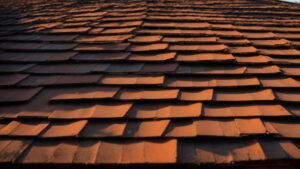Introduction to roofing shingles
Roofing shingles are essential for protecting your home from the elements, and they come in different materials. The two most common types are asphalt and rubber shingles. Asphalt shingles are popular due to their affordability and durability, while rubber shingles are known for their eco-friendly nature and resistance to extreme weather conditions. Understanding the differences between these shingle types can help you make an informed decision when it comes to your roofing needs.

Understanding asphalt roofing shingles
Asphalt roofing shingles are the most popular choice for homeowners due to their durability and affordability. They are made of fiberglass matting covered in asphalt and ceramic granules. Here are some key points to understand about asphalt roofing shingles:
- Asphalt shingles are available in a wide range of colors and styles, making it easy to find the perfect match for your home.
- These shingles are relatively easy to install, reducing labor costs compared to other roofing materials.
- Asphalt shingles are resistant to fire and wind, making them a great choice for areas prone to extreme weather conditions.
- They typically have a lifespan of 20-30 years, depending on the quality and maintenance.
- Regular inspection and maintenance can help extend the lifespan of your asphalt roofing shingles.
Pros and cons of asphalt roofing shingles
Asphalt roofing shingles offer good durability and a variety of styles and colors to choose from, giving homeowners flexibility in achieving the look they desire for their homes. They are also a cost-effective option for roofing, making them a popular choice for many. However, it’s important to note that asphalt shingles may be susceptible to damage from extreme weather conditions, such as strong winds and hail. Additionally, they may need more frequent replacement compared to other roofing materials.
Introduction to rubber roofing shingles
Rubber roofing shingles are a sustainable and durable alternative to traditional asphalt shingles. They are made from recycled materials, predominantly rubber from old tires, which makes them an eco-friendly choice for your home. Additionally, rubber shingles are resistant to harsh weather conditions, such as wind, rain, and hail, and have a longer lifespan compared to asphalt shingles. The initial cost of rubber roofing shingles is slightly higher than asphalt shingles, but the long-term benefits outweigh the investment.
Pros and cons of rubber roofing shingles
Rubber roofing shingles are known for their durability and resistance to extreme weather conditions. They are also lightweight, making them easier to install and transport. However, they may be more expensive compared to asphalt shingles. Rubber shingles have a longer lifespan, typically lasting up to 50 years, while asphalt shingles last around 20-25 years. Another advantage of rubber shingles is their eco-friendliness, as they are often made from recycled materials. On the downside, rubber shingles may be prone to punctures and can be more challenging to repair compared to asphalt shingles. Additionally, their initial cost may be higher, although they may prove to be more cost-effective in the long run due to their durability.
Comparison between asphalt and rubber roofing shingles
Asphalt roofing shingles are a popular choice due to their durability and affordability. They are made of a fiberglass mat, which is then covered with asphalt and coated with mineral granules. On the other hand, rubber roofing shingles are gaining popularity for their eco-friendly qualities and resistance to extreme weather conditions. They are made from recycled materials, such as tires, and offer good insulation properties. When comparing the two, asphalt shingles are more widely available and easier to install, while rubber shingles are more energy-efficient and have a longer lifespan. Understanding the pros and cons of each type will help you make an informed decision when choosing the best quality roofing shingles for your home.
Durability and lifespan of each type
Asphalt shingles are known for their durability, lasting anywhere from 15 to 30 years, while rubber shingles have a slightly longer lifespan of 30 to 50 years. Both types can withstand various weather conditions, but rubber shingles tend to be more resistant to extreme temperatures and harsh weather, making them a durable option for roof covering.
Weather resistance and maintenance
When it comes to weather resistance, asphalt shingles are known for their durability and ability to withstand various weather conditions. They are designed to resist damage from wind, rain, and hail, making them a reliable option for protecting your home. Additionally, asphalt shingles require minimal maintenance, making them a convenient choice for homeowners looking for a low-maintenance roofing material. On the other hand, rubber shingles are also highly weather-resistant and can handle extreme temperatures and harsh weather conditions with ease. In terms of maintenance, rubber shingles are known for their longevity and require minimal upkeep, which can save you time and money in the long run.
Cost comparison
When it comes to cost, asphalt shingles are generally more affordable than rubber shingles. The average cost of asphalt shingles ranges from $70 to $150 per square (100 square feet), while rubber shingles can cost between $200 and $400 per square. Keep in mind that these prices can vary based on factors such as the brand, quality, and installation requirements.
Conclusion and best choice
After comparing asphalt and rubber roofing shingles, it is clear that asphalt shingles are the best choice for most homeowners. They are more affordable, easier to install, and have a longer track record of performance. Additionally, asphalt shingles come in a wide range of colors and styles to suit different aesthetic preferences. While rubber shingles offer some benefits, such as durability and environmental friendliness, they are less commonly used and may be more difficult to find and install. In conclusion, for the best quality and overall value, asphalt shingles are the preferred option for residential roofing.



